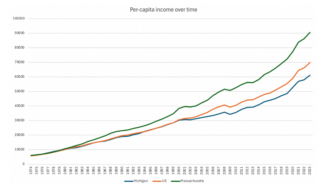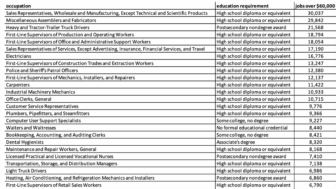It was an honor to serve as a member of Governor Snyder’s Building the 21st Century Economy Commission. Its report is really worth reading. Thanks in large part to the leadership of Detroit Regional Chamber CEO Sandy Baruah, the Commission Chair, and terrific staffing by PwC, the report provides a visionary roadmap of what Michigan needs most to do to be economically successful twenty years from now and beyond.
Starting with its goal of prosperity for all. Not assuming that some combination of a low unemployment rate, a growing gross state product and being business friendly will lead to economic well being of all Michigan households.
To achieve that goal the report identifies four state policy levers that matter most:
- Talent: The state with the best talent wins the 21st century
- Infrastructure: Serious investment in our public goods is overdue
- Business climate: Consistent, efficient and customer centric
- Quality of life: A necessity, not a luxury, in the 21st century
Equally important is what the report does not recommend:
- No path to returning to the high-wage, low-education-attainment economy that made Michigan one of the most prosperous places on the planet for most of the 20th Century
- No picking industries of the future that someone believes are the key to future economic success.
- No call for tax cuts or reduced government spending
All of the above have way too often been the strategies proposed here and around the country. They haven’t moved Michigan towards prosperity for all in the past and almost certainly won’t in the future.
In his transmittal letter Baruah lays out the major themes of what a path to prosperity for all needs to look like. He writes:
Our core ethos boils down to two points: First, Michigan is a state with tremendous assets and advantages. We have much to be proud of and a strong base upon which to prepare for a dynamic and uncertain future. Second, unless we take collective action to “grab the tiller” and bend some upcoming demographic and economic trends, our state will not be among the winners in the 21st century global economy.
While this report has many specific recommendations, here are some of the broad themes:
- Talent rules. The correlation between educational achievement, especially bachelor’s degrees, is highly correlated with per capita income. Michigan will not succeed in the 21st century global marketplace unless we are able to attract more highly educated persons and enhance the education levels of existing residents to meet the skill demands of the future.
- Michigan is the mobility state. Michigan defined innovation in the early part of the 20th century with the advent of the automotive industry. Today, our state has the opportunity to lead again in the
coming revolution of the connected and autonomous vehicle. Michigan’s need to lead in this space must be a shared priority for all Michiganders.
- The world is a more competitive place. As recently as the 1980’s, the United States was the world’s only economic and academic superpower. Today, our competition comes from every corner of the globe, with multiple challengers in every industry and field.
- Quality of place matters. Whether large or small, urban or rural, having attractive and compelling communities that leverage their natural assets is critical. The trend towards people choosing where they live based on quality of life as opposed to job considerations will continue to accelerate.
- The speed of change will only accelerate. The pace of changes in technology, and in societal norms and business practices, will only increase over time. The key to success in this rapidly evolving environment is not to try to predict these trends, but to develop the capacity for flexibility in our population and institutions.
To accomplish this, Michigan will need to take a different approach to investment in public goods—“the commons”—than we have for the last generation.
Hopefully this report will change the nature of the debate in Lansing. With both parties offering competing ideas on “a different approach to investment in public goods than we have for the last generation.” Only then will we get on a path to returning Michigan to prosperity for all.












